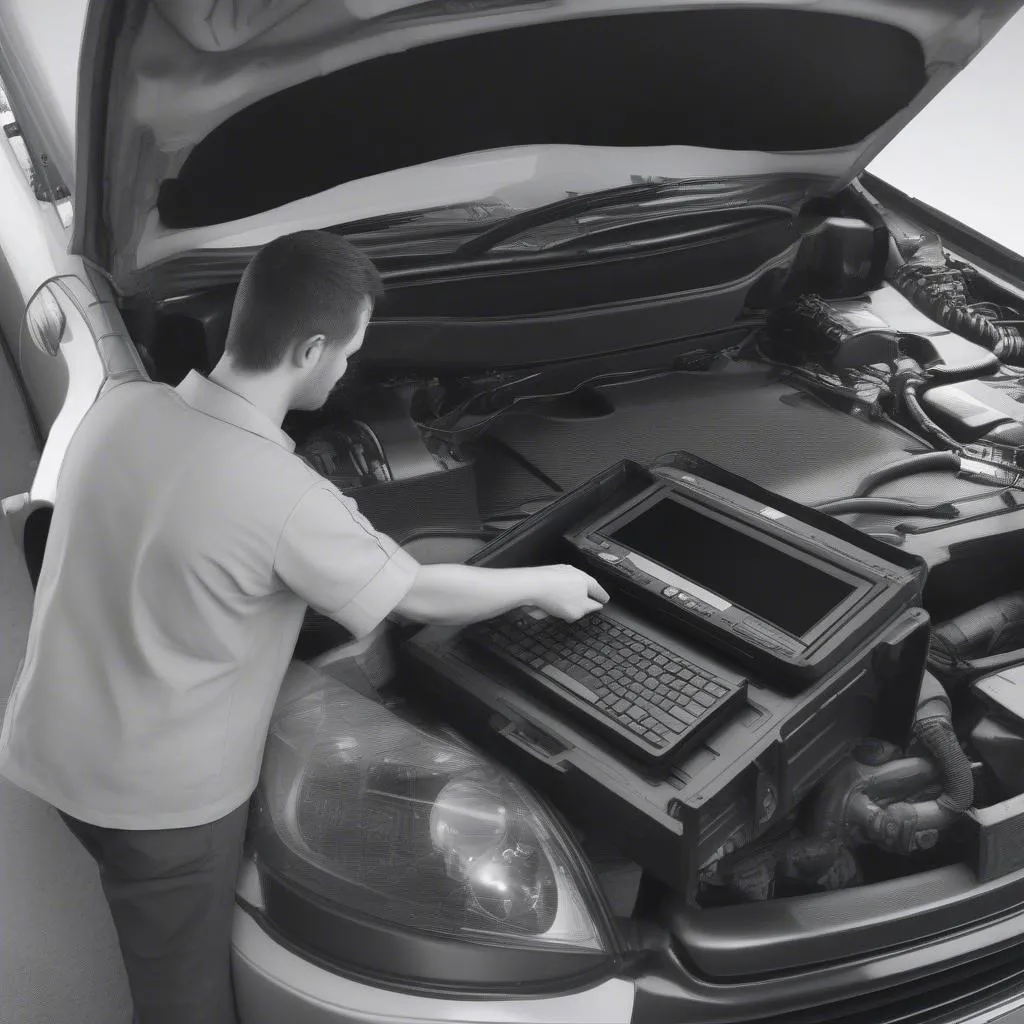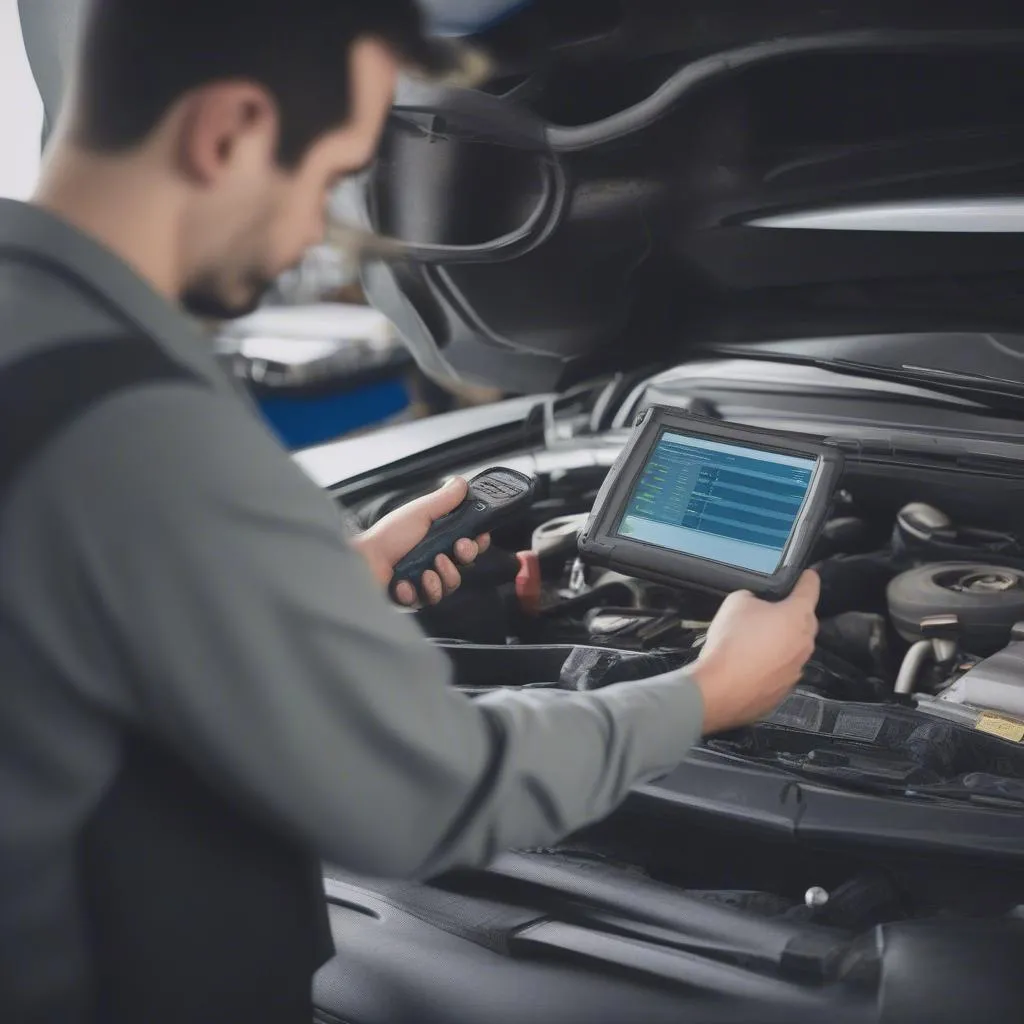Imagine this: your engine throws a temper tantrum, lighting up your dashboard like a Christmas tree. You take it to a mechanic, and they hook up a strange device to your car’s computer. The mechanic starts talking about a “learning tool scan.” Sound familiar? A learning tool scan might sound intimidating, but it’s actually your ticket to understanding and fixing your car’s electronic woes.
What is a Learning Tool Scan?
The phrase “learning tool scan” can be interpreted in a few ways:
From a Mechanic’s Perspective: It often refers to using a professional-grade automotive diagnostic scanner, like those used by dealerships (think Dealer Scanner for European Cars), to access the vehicle’s computer system. This scan dives deep, reading diagnostic trouble codes (DTCs), analyzing live data from various sensors, and even performing special functions like TPMS relearns or adaptive learning resets.
From an Automotive Technician’s Viewpoint: It signifies the process of using a scan tool to not just identify problems, but also to “learn” about the car’s specific configuration and stored data. This learning aspect is crucial for understanding intermittent issues, adapting to repairs, and ensuring everything functions harmoniously.
Economically Speaking: A learning tool scan, though it might seem like an added cost upfront, can save you money in the long run. By pinpointing the root cause of a problem, it prevents unnecessary part replacements and repeat visits to the mechanic.
Demystifying the Learning Tool Scan: A Deeper Dive
Let’s break down how a learning tool scan actually works and what benefits it offers:
Accessing the Car’s Brain
Modern vehicles are packed with Electronic Control Units (ECUs). Think of these as mini-computers that manage everything from your engine to your airbags. The learning tool scan acts as a bridge between these ECUs and your mechanic.
Unmasking the Trouble Codes
When something goes wrong, your car’s ECUs generate Diagnostic Trouble Codes (DTCs). These codes are like cryptic messages that require decoding. A learning tool scan retrieves these DTCs, allowing the mechanic to understand the nature of the problem.
Beyond the Codes: Live Data Analysis
The real magic of a learning tool scan lies in its ability to display real-time data from various sensors throughout your car. This information provides a dynamic view of your car’s health, helping pinpoint issues like faulty oxygen sensors, failing fuel pumps, or even a slipping transmission.
 Automotive Diagnostic Scanner
Automotive Diagnostic Scanner
Specialized Functions: The Power of Adaptation
Many modern cars require specialized procedures after repairs, such as:
- TPMS Relearn: This procedure helps your car recognize new tire pressure sensors after a tire change or rotation.
- Adaptive Learning Reset: This resets learned values in the car’s computer, allowing it to adapt to new parts or driving conditions.
A learning tool scan equipped with the right software can execute these functions, ensuring everything works flawlessly after repairs.
Common Questions About Learning Tool Scans
Here are some questions car owners frequently ask about learning tool scans:
-
“Can a generic OBD-II scanner perform a learning tool scan?” While basic OBD-II scanners can read and clear some codes, they lack the depth and functionality of professional-grade learning tool scanners. These advanced scanners, often specific to car makes (like Dealer Scanner for European Cars), can access all the ECUs, perform specialized functions, and provide comprehensive data for accurate diagnostics.
-
“How often should I get a learning tool scan?” While there’s no set schedule, it’s generally recommended to have a learning tool scan performed annually as part of your car’s routine maintenance. Additionally, consider a scan if your check engine light comes on, you experience unusual performance issues, or after any significant repairs.
-
“Can I perform a learning tool scan myself?” While DIY options are available, they may not offer the same depth and functionality as professional-grade tools. Additionally, interpreting the data and performing specialized procedures often require technical expertise.
Beyond the Scan: Your Path to Automotive Wellness
Remember, a learning tool scan is just the first step. It’s like a detective gathering clues. Once the problem is identified, a qualified mechanic can use their expertise to interpret the data, recommend the appropriate course of action, and get you back on the road with confidence.
 Mechanic using scan tool to diagnose car problem
Mechanic using scan tool to diagnose car problem
Looking for more car care tips and insights? Check out these related articles:
- Can the Matco Scan Tool Clear Adaptive Learning Tables?
- TPMS Learning Tool
- How to Read a Scan Tool
- RMF Scanning Tools
Need help with diagnostic tools or have car troubles in [Your City, State]? We’re here to help! Contact our automotive experts via WhatsApp at +84767531508 for 24/7 support. We can help you find the right diagnostic solutions and get your car back in tip-top shape.


